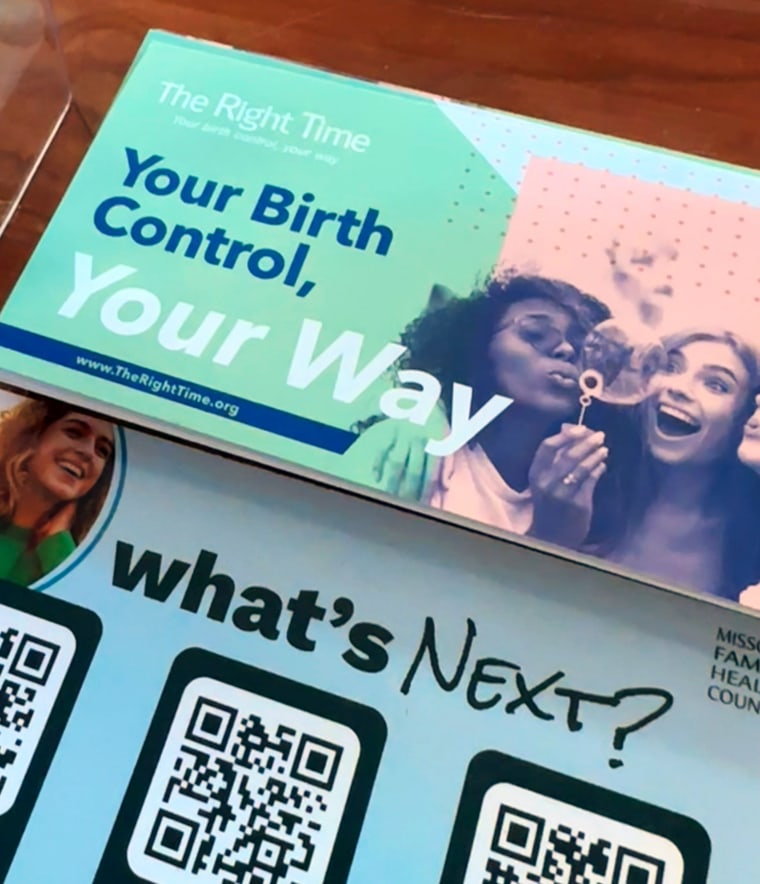ST. LOUIS — Millions of Americans will be able to vote on November ballots whether to protect access to contraception.
In states where tensions have long boiled over reproductive rights, family planning experts say women face mounting barriers to getting birth control. The fear, confusion and anxiety over abortion has extended to their ability to prevent a pregnancy.
In June, Senate Republicans blocked a bill that would have enshrined a national right to birth control into law. States have been left to decide if they will protect access to birth control.
One of those states is Missouri, the first state to use a trigger law to ban all non-medically necessary abortions. Voters will decide on an amendment that would remove the ban. If passed, the amendment would also protect the right for women and their doctors to make decisions about their reproductive health care, including birth control, without government interference.

People in Maryland, where abortion is legal until a fetus is viable, will vote on a similar amendment that would establish “the ability to make and effectuate decisions to prevent, continue, or end one’s own pregnancy.”
The votes come at a time when some women are finding it increasingly challenging to fill their prescriptions for birth control. Access to low-cost contraceptives, including IUDs, the pill and patches, was under pressure in the South and rural areas even before the Supreme Court overturned Roe v. Wade in 2022. That decision created new barriers, experts say.
An estimated 19 million women of reproductive age are now living in so-called contraceptive deserts, counties where people have trouble accessing a range of birth control options, according to data from the reproductive rights nonprofit Power to Decide.
The right to contraception is protected by two landmark Supreme Court cases. Some Supreme Court justices have said they have their eye on revisiting the rulings.
“We saw what the Supreme Court did on abortion, and now there’s a real risk they may do the same thing on contraception,” Sen. Elizabeth Warren, D-Mass., said on MSNBC’s “Morning Joe” after the June 2022 ruling.
Eleven states and Washington, D.C., have laws that protect the right to contraception, according to data from the Guttmacher Institute, a research group that supports access to abortion.
Lawmakers in Arizona, Iowa and Virginia have introduced bills that would protect their residents’ right to contraception, and such an amendment is likely to be on the ballot in Nevada in 2026. Earlier this year, the Virginia bill passed both chambers but was vetoed by Republican Gov. Glenn Youngkin.
Without such laws in place, “we see lots of attempts to ban different forms of contraception,” said Michelle Trupiano, executive director of the Missouri Family Health Council.

In 2021, the Missouri Senate voted on a bill that would have excluded emergency contraception from the state’s Medicaid program.
“I don’t think that should be paid for by taxpayer dollars,” Missouri Republican state Sen. Denny Hoskins told NBC News, adding that he plans to vote “no” on Amendment 3, which would protect the right to contraception in the state and reverse abortion restrictions.
Hoskins said while he “believes in” birth control pills and IUDs, he does “not support the morning-after pill.”
Through the end of this year, Texas is legally excluding emergency contraception from its Healthy Texas Women program, which provides care to low-income women.
Morning-after pills such as Plan B have been available over-the-counter nationwide since 2014. The pills don’t end a pregnancy, as some conservative lawmakers and opponents of abortion claim. Instead, the medication delays ovulation so a woman doesn’t become pregnant, according to the Mayo Clinic.
Some religious and policy leaders also wrongfully assert that IUDs are abortifacients, which has led to resistance to clinics offering them.
“We see politicians that fuel that confusion, that purposely conflate abortion and contraception and that are pushing laws to limit some forms of contraception,” Trupiano said.
Is birth control legal in all states?
All Food and Drug Administration-approved birth control is currently legal in the U.S., but in some states, including in Missouri, pharmacists can legally refuse to fill a patient’s prescription due to personal religious beliefs.
The refusals contribute to confusion over contraception, experts say.
In Missouri, about half of adults don’t know that emergency contraception is legal there. At least 40% don’t know that IUDs are legal, and one-quarter either don’t believe or don’t know that birth control pills are legal in the state, a 2023 survey by the Missouri Foundation for Health found.
“Many people become confused about what exactly is contraception versus what is an abortion,” Hoskins said.
In the days after the Supreme Court decision, Maggie Olivia, a policy manager with Abortion Action Missouri, an advocacy group for abortion rights, remembers getting a flood of calls from women who were afraid their IUDs were suddenly illegal.
“I remember somebody called the office and asked if she needed to rip her IUD out herself,” Olivia said. “She was so scared.”
The amendment on Missouri’s ballot this year “is really a proactive measure that will keep politicians from being able to restrict that access,” Trupiano said. “It’s not in and of itself going to fix the deserts that currently exist, but it will give us a strong foundation to build off of instead of constantly having to defend for our rights.”
The next step would be to work on funding, Trupiano said.
Title X family planning grants, money allocated to some clinics by the federal government, play a major role in funding family planning services for women living near or at the federal poverty level, including birth control and preventive health services such as Pap smears. But the initiative has received the same amount of funding every year since 2014.

Kate Wagner, a nurse practitioner with the Jefferson County Health Department in Missouri, has been in health care for over 20 years. She works at a family planning clinic that is benefiting from Title X funding, which means right now, uninsured patients can get birth control through the clinic.
Most patients are locals, but some drive as much as an hour and a half to reach the clinic, Wagner said.
“In our area, we’re unique, because not everyone around us has that option to offer everything,” she said, noting that not all forms of birth control are right for everyone, so having a range of options available is important.
One of her patients recently asked if she could get her Nexplanon implant, a hormonal birth control that lasts up to three years, changed six months early in case she loses access.
“Our patients are like, what’s going to happen next?” she said.

